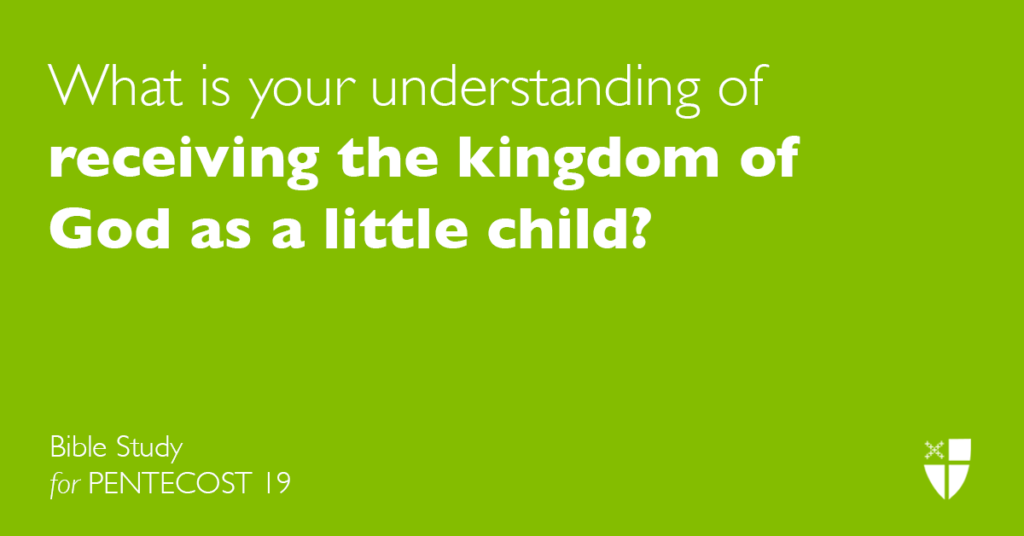This page is available in: Español
Bible Study: Proper 22 (B) – 2021
October 03, 2021
RCL: Job 1:1; 2:1-10; Psalm 26; Hebrews 1:1-4; 2:5-12; Mark 10:2-16

Job 1:1; 2:1-10
We encounter in the Book of Job an incredible story in which a blameless and upright man experiences suffering for no reason. This book has been interpreted by many as responding to the question of divine justice – is God just? However, when we delve more deeply into the story, and as we see in the selection of verses today, there is a different question that is being explored. The Satan, or the adversary, asks of God the question regarding the possibility for selfless love. Can non-transactional love exist? Job is upright and blameless, but will he remain so if his circumstances are not so great? Satan thinks not, and therefore asks God to test Job. God allows Satan to cause Job to suffer, so long as Job is not killed. Missing from our section is the first test of Job’s integrity and uprightness; he loses his children, his livestock, and his possessions. Through all of this, Job remains sinless. This is important because it sheds some light on Job’s wife’s reaction to Job’s second test—that of receiving sores all over his body. Remember that she, too, has lost her children. “Curse God, and die” she almost begs. How can Job hold on to his integrity after all this suffering?
- How do you respond to Job’s question: “Shall we receive the good at the hand of God, and not receive the bad?”
Psalm 26
Continuing with the theme of integrity, the psalmist calls out a lament to God, wanting vindication for good behavior, for walking rightly. The structure of the psalm is almost chiastic, beginning and ending by mentioning walking in integrity, desiring vindication and redemption (vv. 1-3, 11-12). There is an active turning from those who are considered wicked (vv. 4-5) and the request not to be considered as one of them by God (vv. 9-10). The center of the psalm uses language that evokes imagery of liturgical action, suggesting that the psalmist is from the priestly order – washing hands, walking around the altar, singing a song of thanksgiving, telling the deeds of God (vv. 6-7), and claiming love for the house of God (v. 8). In the end, the psalmist trusts in God and continues to walk the path with integrity.
- If you were writing a lament to God, how might yours be similar or different to this psalmist’s?
Hebrews 1:1-4; 2:5-12
Hebrews paints a picture of Jesus Christ in the fullness of his divinity and humanity. In the first four verses, we are introduced to Jesus as the Son, heir, participating in creation, as sustainer, the “reflection of God’s glory and the exact imprint of God’s very being” (v. 1:3), the one who made purification for sins, and one greater than the prophets and the angels. When we move to the second chapter, the author quotes Psalm 8, which discusses humanity as lower than angels and yet having all things subject to them. Noting that humanity has not yet fulfilled this psalmist’s claim, the author points to Jesus in his humanity as the model for this kind of movement from lower-than-angels to glory and honor. The achievement of this, however, is not through ascent in the human realm, but rather through a path of descent with suffering and death. It is in this experience of full humanity, unto death, that we are made siblings of Christ.
- What does “subjecting all things under their feet” (v. 2:8) mean in light of Jesus’ example?
- What does being a brother or sister of Christ mean to you?
Mark 10:2-16
This passage from Mark has three episodes – one with the Pharisees, one in the house with the disciples, and the final one with children. It begins with the Pharisees questioning Jesus about the legality of divorce. Jesus points them to the laws of Moses, asking them to answer their own question. Upon their affirmative answer, Jesus refers them back to Genesis, to our creation as male and female, and the ideal of marriage that makes two people become one. The disciples need clarification, however, and so when they are in the house, they ask Jesus to explain further. Here, Jesus expands the original question by introducing the possibility of the wife also divorcing the husband. This is significant, and more relevant for today, given that divorce is a common occurrence now. While the result is the same, Jesus points out to the disciples that societal expectations are too limited, focusing merely upon the rights of the man to divorce the woman. Creation shows us a more expansive ethic.
The disciples continue to participate in societal and earthly norms, attempting to keep the children – those without rights, the weakest of society – from coming to Jesus. But he tells them that the kingdom of God belongs to these innocent and weak children of God.
- Jesus refers to Genesis, pointing out an egalitarian system between male and female. How might this change our understanding of other aspects of our creation stories?
- What is your understanding of receiving the kingdom of God as a little child?
- Who in our society are we keeping at a distance from Jesus’ feet? Why?
This page is available in: Español
Don’t forget to subscribe to the Sermons That Work podcast to hear this sermon and more on your favorite podcasting app! Recordings are released the Thursday before each liturgical date.
Receive Free Weekly Sermons That Work Resources!
This page is available in: Español


